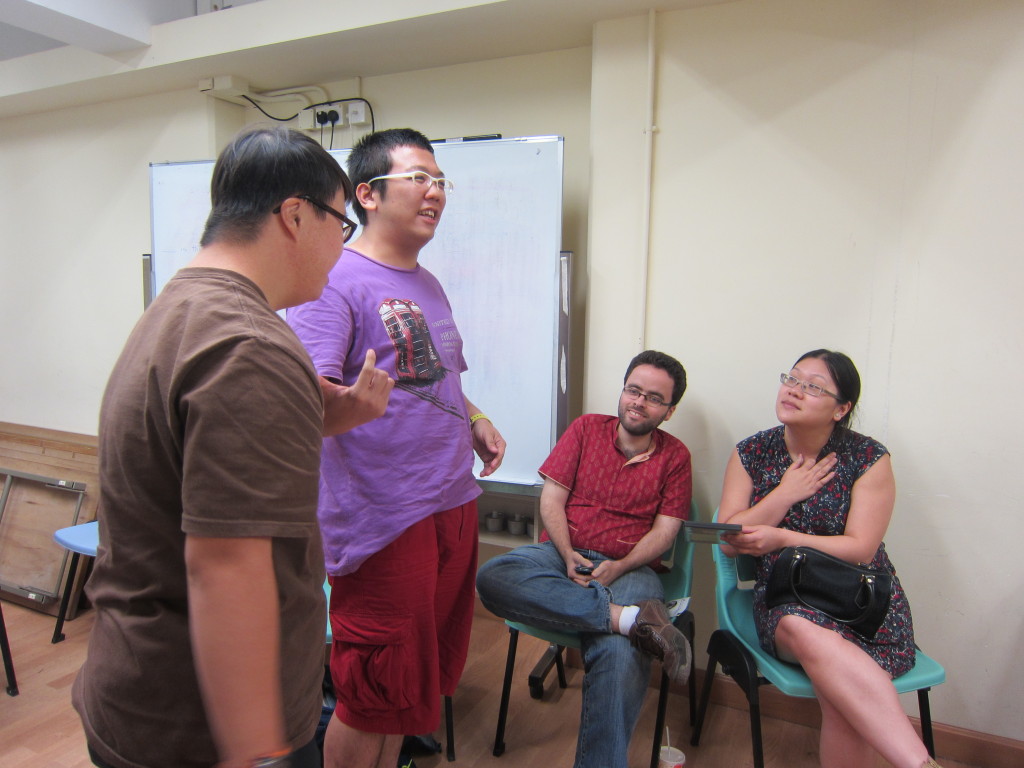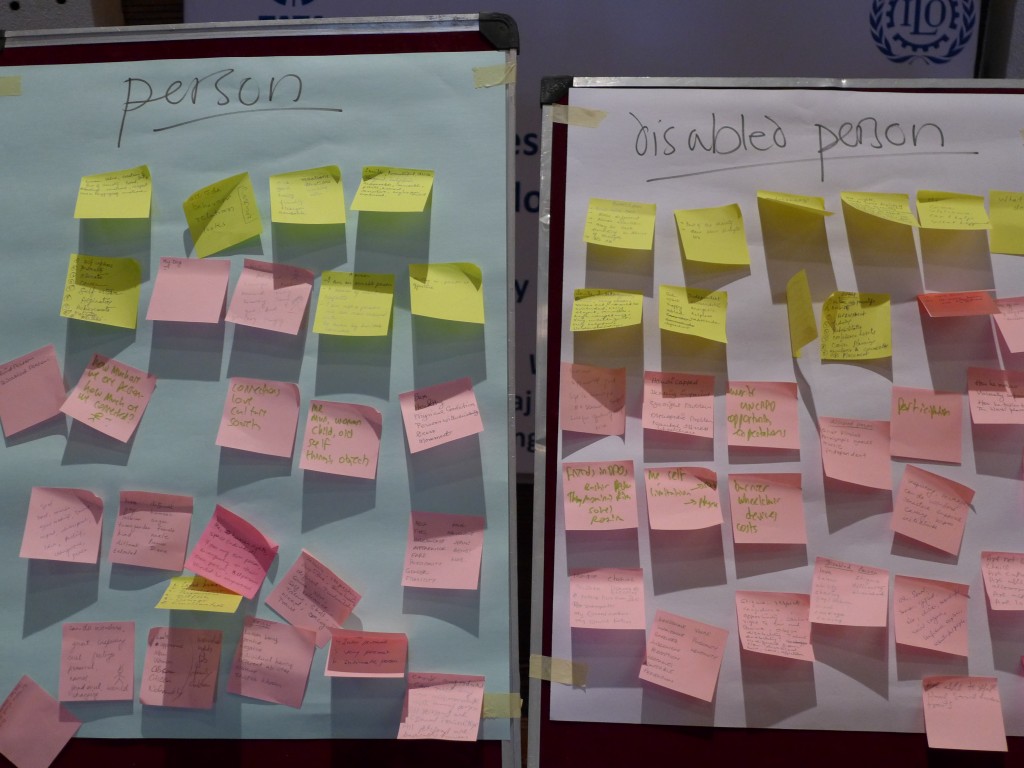One of the real concerns for disabled people in Bangladesh is that of employment. At every level, from those who have little or no education, to those with postgraduate degrees, getting and maintaining a livelihood is tough. By choice or by accident, employers often aren’t ready to employ disabled people. They don’t think that people with disabilities can do the work, and they’re often not ready to make the necessary adaptations. What can be done? On a trip to India I came across great examples of organisations that are bridging this gap.
How to matchmake between disabled people and employers? Experiences from India (part 1)
Comments Off on How to matchmake between disabled people and employers? Experiences from India (part 1)
Filed under Employment
What do you think when I say “disabled person”?
As soon as she said “disabled person” I realised what the problem was. Disability is a natural part of life. People with disabilities make up 15% of the world’s population, and include men, women, young, old, our families, ourselves and everything in-between. But when you ask people what they think when you say “disabled person”, you get answers that are pretty specific. Not answers that begin to gesture to a billion people alive in the world right now.
Comments Off on What do you think when I say “disabled person”?
Filed under Uncategorized
Great report on disability and development. But why hadn’t we done it before?
“We’re delighted“, and “fully agree” with the “landmark” report released by the UK Parliament yesterday. Disability and Development is a series of recommendations to the Department for International Development (DFID) outlining both why it should and how it can strengthen its commitment to disability. It was welcomed so warmly by organisations working on disability because it brings together what we’ve been saying for a while. I’ll go through the why and how of disability inclusion described in the report, and then the question I want to ask in this post is – if this was so clearly the right thing – why hadn’t it been done before?
Comments Off on Great report on disability and development. But why hadn’t we done it before?
Filed under Mainstreaming
What has the disability movement achieved in North-West Bangladesh?
Last week I went to a disability convention in Rajshahi, a vibrant city close to the Indian border and on the banks of the river Padma. A convention means that we had speeches. And then more speeches. All Day. In the evening there was a cultural event with dancing and songs and skits but by that time I had been so speechified I went home.
On the one hand this was a bit boring and I didn’t follow what everyone said. But on the other hand this was awesome and shows how much has been achieved by disabled people in Rajshahi.
Comments Off on What has the disability movement achieved in North-West Bangladesh?
Filed under Bangladesh
Disability and the Global South: time for some double discrimination
Good news today in disability and development: welcome to Disability and the Global South, an open-access journal that has released its first edition. Browsing through a couple of the articles, I found…
A couple of articles that made points on intersectionality. In her voices from the field piece, Myroslava Tatryn illustrates how on the one hand development programs ignore disabled people –
“Everyone is coming in to do HIV now, but no one will come to us. What? They think that we’re not also at risk? Don’t they see we also have children? How do they think that happens?”
and on the other hand how the disability movement doesn’t address these issues either –
“In South Africa, we know of the epidemic of rape rampant throughout the country. But how many disabled peoples organisations or disability-focused agencies are doing anything about sexual violence?
Comments Off on Disability and the Global South: time for some double discrimination
Filed under Uncategorized
If you do not want to be trapped – a self-help group in Hong Kong
There’re special environments you come across in places where disabled people have gotten together. Places that you feel welcome into a community and you see what that community has done for its members. When a friend and I visited Chosen Power in Hong Kong earlier this month I felt this again, reminding me of how much I enjoy spending time with and working with disabled people.
Chosen Power is a self-help organisation for people with different learning abilities in Hong Kong. Founded in 1995 it now has over 100 members with different learning abilities. They run the organisation, conducting activities in both Hong Kong and internationally. It is a place where people with intellectual disabilities have joined together to speak for themselves.

Comments Off on If you do not want to be trapped – a self-help group in Hong Kong
Filed under Case Studies
Redesigning the fishing pole – a call-centre in Singapore
A few months ago I was lucky enough to visit Eureka Call Centre Systems in Singapore. They’re a call centre that some years ago decided to include disabled people. Faced with staff regularly leaving, they “needed to innovate”. The innovation they chose was to include people with visual impairments. Fast-forward a few years and they are a flourishing organisation that are experts on inclusion of disabled people. Supported by the Singaporean government they run a Centre for Training and Integration for persons with disabilities to be integrated more widely in the call centre industry.
Comments Off on Redesigning the fishing pole – a call-centre in Singapore
Filed under Case Studies
Why does the aid industry ignore disabled people?
Tim Wainwright, CEO of Action on Disability and Development asks the question in a post titled Development’s Cinderella?. It’s worth seeing the post for a collection of the reasons that the aid industry should include people with disabilities and also for examples of the changes that can be made when people with disabilities are included.
But I’m not sure if we’ve gotten closer to answering why it is that the aid industry ignores disabled people. People with disabilities are being ignored despite many things: despite the need of people with disabilities (as shown in the statistics quoted); despite an international UN Convention; despite many aid agencies having specific policies on disability. It is despite all these things that people with disabilities continue to be excluded from mainstream development work, its programmes on the ground, the decision-making surrounding them, and participation in the implementation as staff or in some other capacity.
Comments Off on Why does the aid industry ignore disabled people?
Filed under Mainstreaming
Planting a Seed: Working on Policy
One of things that I’ve been working on is developing a policy for inclusion of people within skills development in Bangladesh. It’s been very exciting to get input from government and disability organisations to see what the recommendations are. There’s an article here on what the Working Group on Disability Inclusion in TVET has been doing.
Comments Off on Planting a Seed: Working on Policy
Filed under Bangladesh
Just Over 4.5 US Dollars Per Month: Cash Transfers in Mozambique
Meet Carlito, in Mozambique.
Carlito receives around 4.5 USD a month as a beneficiary of a programme providing support for the elderly and people with disabilities considered unable to work. As Carlito shows us in the video, even after receiving the money he still has to rely on family and friends for food and getting about the place. And as he tells us, he is by no means unable to work. His dream, in fact, is to have a small shop.
Comments Off on Just Over 4.5 US Dollars Per Month: Cash Transfers in Mozambique
Filed under Case Studies, Social Protection

